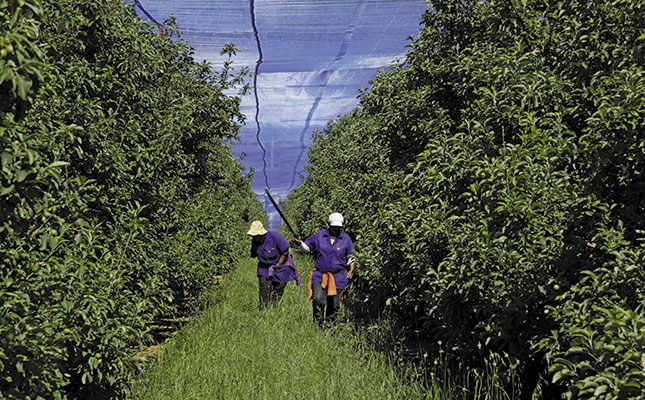
Photo: Glenneis Kriel
“South Africa is heading for a wake-up call. It seems that the country is totally unaware of what is happening in the rest of the world when it comes to sustainable development trends.”
READ:The sawmill that runs on wood gas power
This was the recent warning to farmers by Kobus Pienaar, technical manager of Woolworths’ Farming for the Future campaign. Pienaar was speaking at the Vegetables Under Protection Conference held near Simondium in the Western Cape.
He identified two events set to have a major influence over the way in which the world was farming and doing business. The first was the signing of the United Nation’s sustainability goals in September: Transforming our World: the 2030 Agenda for Sustainable Development. According to the UN, this agenda envisioned the creation of a world where “all life forms can thrive” and was “free of poverty, hunger, disease and want”.
The second event was COP21, the UN’s Conference on Climate Change, taking place in Paris early next month. Here, the goal was to get countries to reduce their carbon footprint in an attempt to combat climate change. South Africa also committed itself to working with other countries to keep the expected temperature increase over the next 15 years to below 2°C, but felt that this target should not be at the cost of economic development in developing countries.
Greenhouse gas emissions were therefore expected to rise and peak in South Africa between 2020 and 2025, and to plateau for a decade before declining. It is estimated that temperature in South Africa will go up by at least 4°C if global temperatures increase by 2°C.
This will have a negative impact on our water resources and production and thereby have a negative impact on economic growth. (Read South Africa’s Intended Nationally Determined Contributions)
The implications
The sustainability agenda, which was signed off in September (with South Africa also a signatory), would come into effect from 1 January 2016 and was supposed to act as guidance for sustainable development over the next 15 years. It had 17 sustainable development goals and 169 targets, which did not bode well for South Africa’s agricultural industry, according to Pienaar.
He said that the bottom line of both the sustainable development agenda and COP21 was that farmers would have to adopt production practices that enabled them to reduce their water, energy and land footprints, and lessen their impact on ecosystems, for example, in their management of problem animals. These production practices should also result in more resilient food production systems which were less vulnerable to extreme weather such as flooding or drought or natural disasters.
“Whether you like it or not, consumers don’t want agriculture to be at the expense of nature. So you have to find environmentally responsible methods to deal with things,” he said.
With regard to climate change, South Africa had committed itself to the introduction of carbon taxes from next year. While agriculture would be exempt from these until 2020/2021, they would have a severe impact on input costs when they arrived.
Pienaar explained that almost everything in the agriculture industry, from fertiliser to packaging, was related to oil prices, and that an increase in energy in one sector would have an impact on others. He urged farmers to consider an off-the-grid plan.
“You can’t wait for Eskom to come up with the solution – it won’t. But alternative energy is becoming more efficient and cheaper; whereas solar power cost about R370/W 10 years ago, you can now get it for R28/W,” he said. Production systems, waste and water management should also be re-evaluated.
“We might have to produce more food under cover as these systems might have the potential to produce higher yield with lower inputs and water than traditional production systems. Or apple orchards in certain regions might have to be ploughed in and replaced by maize,” Pienaar said.
Farmers should also beware of the social component of the sustainable agenda document. “People are no longer satisfied with a minimum wage. They’re looking for a living wage. This is an international trend,” he explained.
The UK system
Pienaar referred to the way in which the New Economic Foundation (NEF), an organisation committed to “economics as if people and the planet mattered”, was shaping ideas about sustainable production. The organisation defined a successful food system as one delivering high well-being, social justice and environmental stewardship. Indicators of such a system were:
- Neutral or positive environmental impact;
- Productive use of energy and energy outputs;
- Diversity in species and genes;
- A supporter of good jobs;
- Short, simple supply chains;
- Assets controlled by a wide, inclusive set of stakeholders;
- A thriving food culture and the highest levels of public health;
Affordable food for everyone.
Based on these criteria, the NEF declared the UK food system a failure. In its report Urgent Recall; Our food system under review, it estimated the environmental impact of the UK food system at £5,7 billion to £7,2 billion per year (R120 billion to R152 billion) or 6,3% to 7,9% of the market price of food. Production was energy-intensive, with eight calories of energy used to produce one calorie of energy from food. It was also too complex and supported poorly paid jobs.
“While industry accounts for 11% of the UK labour force, most are in the least well-paid jobs, with salaries of less than half the UK average,” Pienaar said.
It was also unequal, with 17 million hectares of agriculture land being owned by 0,25% of the population. Based on the environmental impact and cost of obesity and subsidies, the NEF estimated the total external cost of the UK food system to be between £11 billion and £26 billion (between R232 billion and R550 billion).
“The country’s effective food bill is at least 12% or 18% greater than the price paid at the till. The UK food system is failing and with serious environmental, economic and social consequences,” it stated. The organisation proposed that changing the food system would require “new rules to the game” – new policy, a new regulator and institutional framework and new criteria to measure performance.
SA future
Pienaar warned that in future, South Africa would be scrutinised in the same way. He said that between 2002 and 2010 the environmental cost of mining was lower than that of the agriculture sector. In addition, government had approved 45 550ha of virgin soil for agriculture production in the Western Cape in 1989, of which 80% fell in the West Coast. This, according to him, had resulted in 2,7ha of habitat being lost per day over the past 10 years.
“We cannot continue the way we are. We have to find new ways to adapt to the new definitions of sustainability – not just to maintain our markets by satisfying consumers, but for the future of the planet,” Pienaar said. “To this end, farmers will have to find ways to measure their social and environmental footprint and to benchmark themselves against each other to find ways to continuously improve their performance.”
Email Kobus Pienaar at [email protected].
This article was originally published in the 20 November 2015 issue of Farmer’s Weekly.













